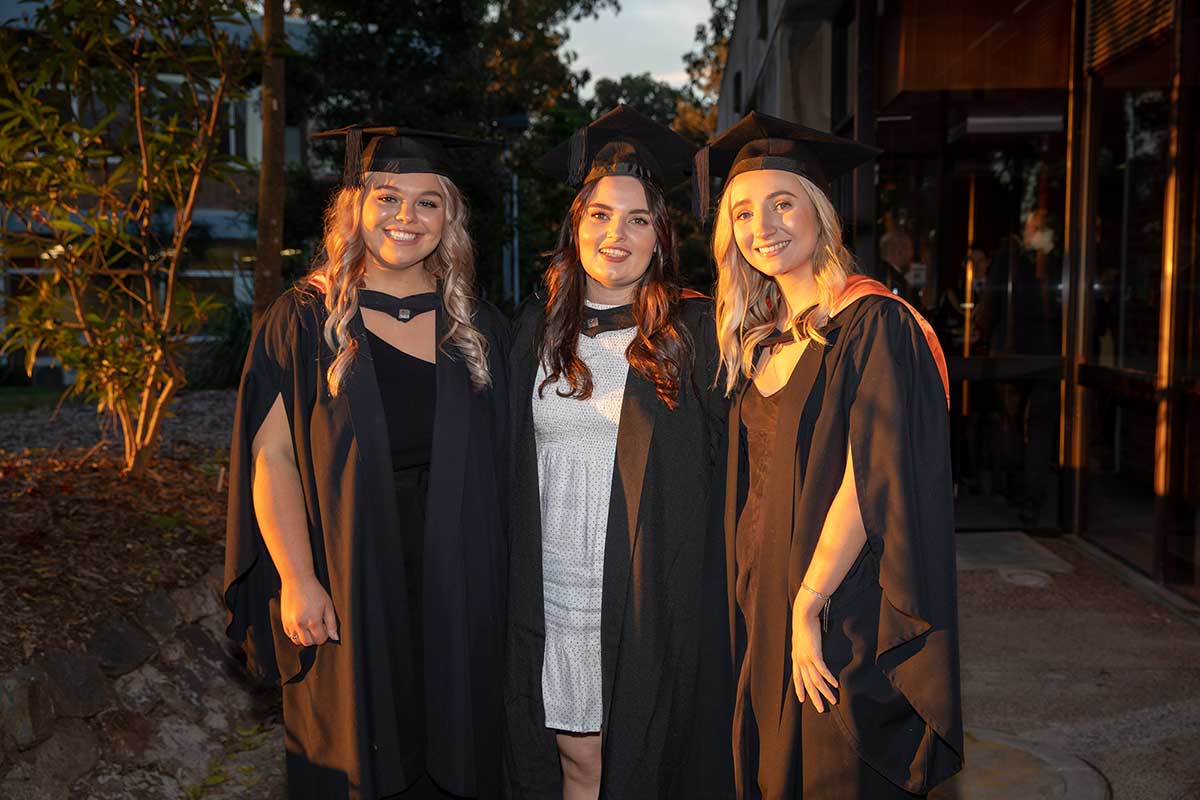Graduation marks milestone for students on their academic journey
In recognition of their significant academic achievement, students across the University of Newcastle’s Callaghan and Ourimbah campuses will mark the culmination of their studies at graduation ceremonies over the next week.

Nursing graduates Harmony Irwin, Isabel Tate and Rebecca Hide celebrated on Friday, where the Governor-General of Australia - His Excellency, General the Honourable David Hurley AC DSC (Retd), was the occasional speaker at their graduation ceremony.
Vice-Chancellor, Professor Alex Zelinsky AO, said graduation was a momentous occasion for students to reflect on the dedication and commitment they had invested in their futures.
“Graduation is an opportunity for our students and their loved ones to reflect on the tremendous outcome of their years of hard work and dedication,” Professor Zelinsky said.
“For many graduating during these ceremonies, their achievement is made even more impressive by the fact they faced significant disruption to their learning throughout the pandemic.”
Professor Zelinsky said the University was committed to preparing life-ready graduates with the skills and attributes to mark them as distinct, globally aware and ready for the rapidly transforming workforce.
“Each year, I feel incredibly proud to be a part of this milestone and I look forward to hearing more about our graduates' achievements as they progress in their careers.”
This year, the University is honoured to welcome His Excellency General the Honourable David Hurley AC DSC (Retd), Governor General of the Commonwealth of Australia to participate in graduation as an occasional speaker.
Students graduating in the June and July ceremonies will join the University's valued alumni network that includes more than 155,000 people spanning more than 149 countries.
Ceremonies will be live streamed via this link.
Graduate highlights
Matthew West
Doctor of Philosophy (PhD) in Podiatry
A proud Wiradjuri man from the Nanima Mission and the first in his family to attend University, Matthew West has always been determined to pursue studies that would help people in local communities.
“My primary focus has been improving the health of my community and being a podiatrist lets me do that at a local level. Lots of people need our skills - children, sports people, older people, people with chronic disease and people with occupational injuries.”
Early in his program, he collaborated with his advisors to design a culturally-safe foot care service for the Aboriginal community on the Central Coast which has grown to include an outreach service in Wellington in Central-West NSW.
He hopes by continuing to practice he’ll be able to both improve people’s health and support the next generation of podiatrists to provide improved models of culturally-safe care.
Throughout his life, Matthew has been strongly supported by his community. As a recipient of the Lowitja Institute scholarship, Matthew received funding that allowed him to focus on his research and provide service that benefits the whole community.
Combining the delivery of personal care to community members with research that advances the health field, Matthew is able to have impact that’s both local and global. He is now one of only two Aboriginal podiatrists in Australia with a PhD.
- Matthew will graduate at 10am on Friday 2 July at Ourimbah campus.
Katrina Stanbury
Bachelor of Social Science (Criminology)
Having received support as a victim of violence earlier in life, fighting for those without a voice was what led third year criminology major Karina Stanbury to university at a mature age.
Entering via the Open Foundation pathway program, Katrina found her calling when completing a work placement with the University’s Bridge of Hope Innocence Initiative. The Initiative is an opportunity for criminology and law students across Australia and the world to work together with authorities on piecing together evidence to reinvigorate cold cases.
Under the supervision of experienced practitioners, students apply their learnings to real cases, whilst time-poor partner authorities like the police receive the findings to help bolster their investigations.
“You become so invested in the work because you know you’re doing something which has the potential to help the victims and family members who are still so desperate for justice.”
Katrina hopes to complete a master’s and eventually return to her home of Grafton to work in advocacy.
“There are people there in need of support, and I know my skills will help fill a gap many regional places are facing”.
- Katrina will graduate 16 July at Callaghan campus
Related news
- Professor Dun recognised with Australian Society for Medical Research award
- Scientists unlock key to breeding ‘carbon gobbling’ plants with a major appetite
- Briefing with Senator Penny Allman-Payne
- Scientists uncover the climate of a planet 280 light-years away
- Sector-first approach to Indigenous health research
The University of Newcastle acknowledges the traditional custodians of the lands within our footprint areas: Awabakal, Darkinjung, Biripai, Worimi, Wonnarua, and Eora Nations. We also pay respect to the wisdom of our Elders past and present.